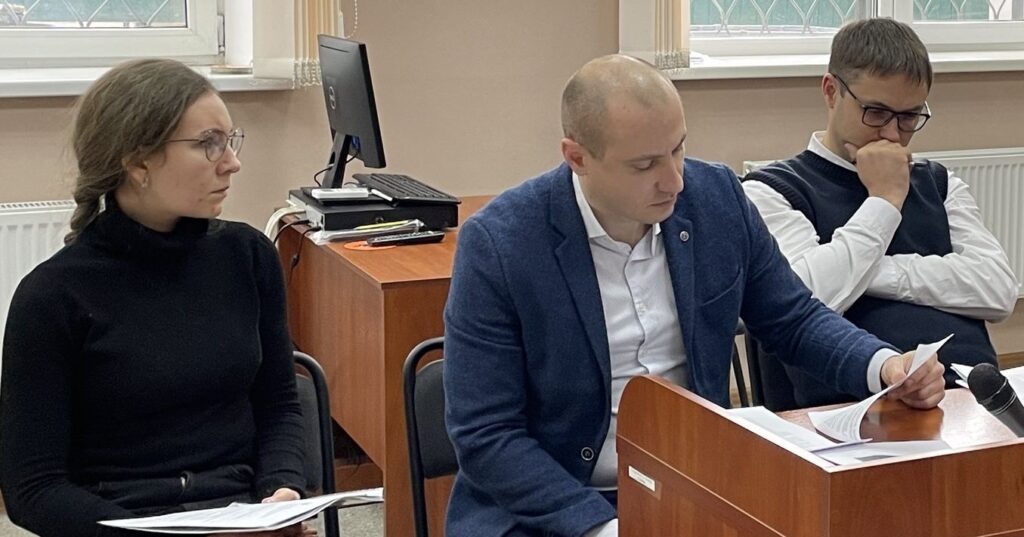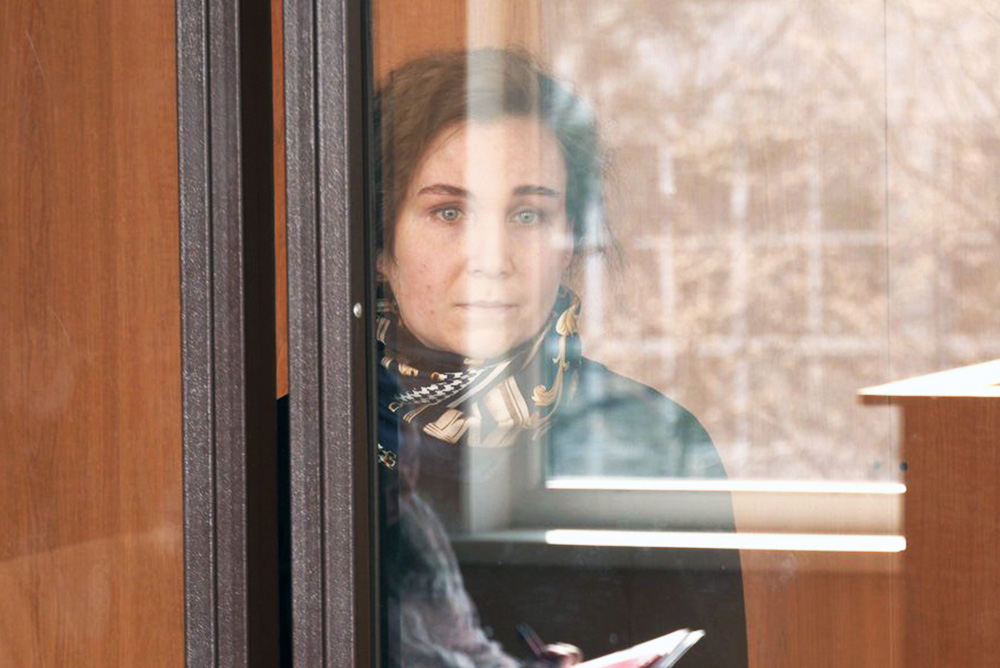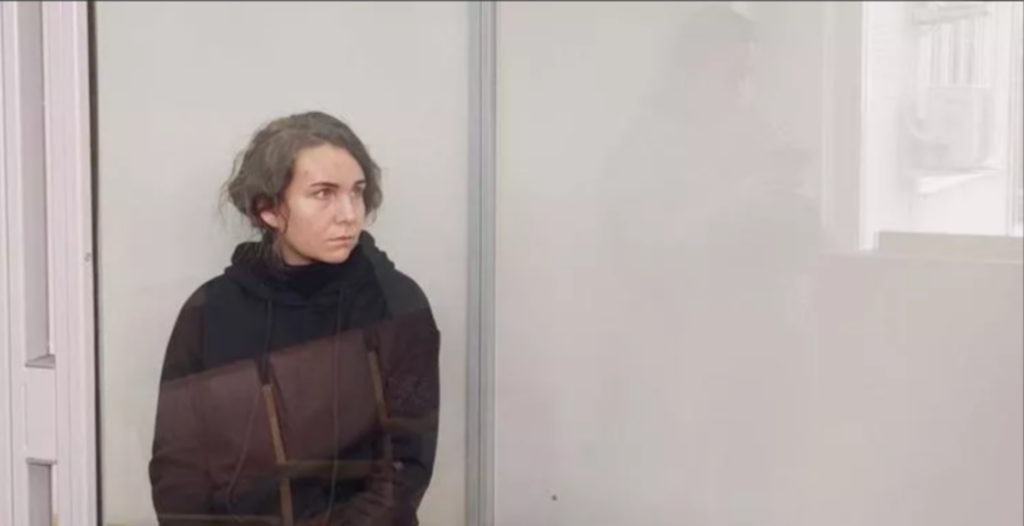SBU officers detained 29-year-old Darya Krygina in Kharkiv in April 2022 on suspicion of committing a crime under Part 3, Article 114-2 of the Criminal Code of Ukraine (unauthorized dissemination of information about the location of the Armed Forces of Ukraine, committed during martial law).
The SBU claims that Krygina arrived in Kharkiv from the LNR and, at the behest of an unidentified handler under unspecified circumstances, identified and transmitted coordinates of military and critical infrastructure in the city, as well as the locations of units and subunits of the Armed Forces of Ukraine and the National Guard of Ukraine. The investigation alleges that the Russian Armed Forces used the coordinates provided by Krygina to adjust their fire on targets in central Kharkiv, resulting in injuries and fatalities.
Darya Krygina was born in Antratsit, Luhansk Oblast, which has been part of the LNR since 2014. However, long before the conflict in Donbas, she left to study in Kharkiv at the Yaroslav Mudryi National Law University, graduating in 2015. She then pursued postgraduate studies there, ultimately earning her PhD. Since 2018, she has held a Candidate of Juridical Sciences degree in “Administrative Law and Procedure: Financial Law: Information Law (‘Legal Regulation of Property Taxes in Ukraine’)”. An announcement of her dissertation defense can be found on the resources of the Ministry of Education and Science of Ukraine. Until 2020, Krygina worked as a lecturer at the Kharkiv National University of Internal Affairs. She left Kharkiv for the LNR no earlier than 2020 and returned in 2021. The trip itself, considering that Darya was born in Antratsit, Luhansk Oblast, where her relatives still live, is unlikely to be the basis of the accusation. The evidence of her recruitment in the LNR remains unclear.

A search of Krygina’s personal correspondence revealed several messages sent to an individual unidentified by the investigation. For example: “Concrete blocks and a checkpoint have been placed in front of the hospital” or “Pyatikhatky is on fire.” The defendant explained that she was communicating with her uncle, who raised her and essentially acted as a father figure. According to her, he has no connection to illegal armed groups; he is a Candidate of Economic Sciences and an associate professor at the Luhansk State University named after Vladimir Dal. This was confirmed by the investigation. The investigation also sent a request to the SBU office in Donetsk and Luhansk Oblasts to determine if Krygina’s uncle was involved in any criminal proceedings related to participation in an “illegal armed formation of the LNR.” It turned out that he was involved in a pre-trial investigation dating back to January 18, 2018, but it did not concern illegal armed formations. Krygina’s uncle has been under investigation since 2018 (and still is) for possible involvement in the creation of LLC “RAPTO,” a coal mining company operating in territories Ukraine considers occupied.
Therefore, the investigation knows for certain that the defendant’s uncle is an associate professor at a university in Luhansk and possibly (but not definitively) has some connection to a commercial coal mining company. No links to illegal armed formations have been established. According to Krygina, she did not transmit any information related to adjusting shelling, as she would not harm herself (military facilities are located near her home). She only shared concerns with a close relative, including those related to military actions.
In this case, the prosecution’s conclusion that Krygina gathered information “for the purpose of transmitting it to representatives of the illegal armed formation of the LNR” is unfounded. Neither the purpose nor the fact of transmission to “representatives of the illegal armed formation of the LNR” has been established.

Two witnesses could not provide any significant information. The first was a security guard at the building where Krygina lived. According to him, he saw her only a few times, she rarely left the house, but “people” allegedly told him that she had “pro-Russian views.” The second person questioned was Krygina’s neighbor. He was personally unacquainted with either the defendant or her mother, who lived with her. He saw Krygina a few times when he went down to the bomb shelter. The witness’s wife had a couple of conversations with Krygina’s mother about where Russian rockets had landed. People have such conversations constantly, as it is a pressing concern.
The defendant underwent a polygraph test twice (December 6 and 21, 2022). The expert who conducted the test stated in court that there were no doubts about the veracity of Krygina’s statements. However, the court did not deem it necessary to consider either the results of the polygraph test or the expert’s testimony.
There are also questions regarding the legality of the arrest. According to official data, Darya Krygina was detained on April 21, 2022, in accordance with Article 208 of the CPC of Ukraine, i.e., at the scene of the crime. The scene of the crime in this case could be considered either the location where the positions of the Armed Forces of Ukraine were recorded or the location where the data was sent (this could even be a person’s home, but the fact of data transmission at that moment, not yesterday or two weeks ago, must be recorded). However, the evidence contradicts the legality of the arrest under Article 208 of the CPC. It states that “after the transmission of this information by representatives of the armed forces of the Russian Federation or other military formations on April 17, 2022, at approximately 13:25, shelling was carried out using artillery weapons with unspecified shells of unspecified caliber on the buildings and territories indicated in Krygina’s information.” This implies, firstly, that the prosecution does not know to whom the information was actually transmitted, and the reference to the LNR is based not on direct evidence, but on Darya’s origins and her trip to see relatives in 2021; and secondly, that the crime was committed before April 17. This means that Krygina could not have been arrested at the scene of the crime on April 21, meaning the arrest was illegal.
It is also perplexing that the SBU was aware of the data transmission as early as March 2022 (the information was entered into the unified register of pre-trial investigations on March 27, 2022), but Krygina was not touched for almost a month, until April 21, waiting for rockets to allegedly hit the targets she indicated. If she had actually committed the crime and been arrested immediately, some rockets might not have been fired, and lives could have been saved. Why didn’t the SBU officers do this?

In late April 2022, Darya Krygina was placed in a pre-trial detention center (SIZO) in Dnipro, where she spent eight months. During this entire period, her case saw no judicial review – the court only repeatedly extended her preventive detention.
Then on December 22, 2022, Judge Lyudmyla Rybalchenko of Dzerzhynskyi District Court in Kharkiv set bail at nearly 500,000 hryvnias (approximately $13,500 at the time). Darya was released from custody the following day, December 23.
On January 31st, 2023, the court began reviewing the case materials. The first piece of evidence was a video of the search. However, the flash drive containing the search recording would not open, and the files were not found. A technical specialist was called to the courtroom, who stated that the flash drive likely sustained damage.
Ukrainian media outlets began discussing the legality of Judge Rybalchenko’s actions in setting bail, calling for her to be held accountable for releasing the alleged “collaborator.” In February, the Ivano-Frankivsk Regional Prosecutor’s Office conducted a search of Judge Rybalchenko’s home in Kharkiv to investigate possible actions taken by the judge to benefit the defendant. The basis for the search was a denunciation stating: “Judge Rybalchenko, while serving as a judge in the Dzerzhinsky District Court of Kharkiv, is taking actions to help Darya K. evade responsibility.” The prosecutor’s office also investigated a possible connection between the judge and the suspect’s uncle, who resides in the LNR (Luhansk People’s Republic). Following these actions, on February 14th, Judge Rybalchenko submitted a statement to the High Council of Justice and the Prosecutor General regarding interference in her work and requested recusal from the Krygina case. The recusal was granted.

Immediately afterward, SBU (Security Service of Ukraine) officers appeared at Krygina’s home and seized a large sum of money in euros, dollars, and Russian rubles. The basis for this search, given that the case was already in court and investigative actions were completed, remains unclear. Was the money not found during the initial search, or did it appear in Krygina’s apartment while she was in pre-trial detention? The origin of the money has not been disclosed by the investigation. If it was payment for guiding missiles, evidence should exist; however, none was presented.
A new court granted the prosecutor’s motion to remand Darya Krygina back into custody without the possibility of bail. This time, she was sent to the Kharkiv pre-trial detention center. Lawyer Alexander Dudarev presented the court with the results of a polygraph examination, which confirmed that the defendant was giving truthful testimony, but this was disregarded.
On February 17th, at the request of the defense, a panel of judges was appointed instead of a single judge, and on March 15th, the trial began anew. The defense attorney requested that the trial begin with witness testimony, as the prosecution’s main argument for keeping Krygina in pre-trial detention was her alleged ability to influence witnesses. These witnesses were the search witnesses and Darya’s neighbors in Kharkiv. The witnesses did not appear. On July 11th, the court kept Darya in pre-trial detention until September 8th. On September 5th, she was sentenced to 11 years imprisonment for treason.
It is important to note that the money seized by the SBU during the second search was returned to Krygina’s mother by the court—no link between these funds and criminal activity was established. This suggests that the purpose of the second search was not to obtain new evidence, but rather to return Krygina to custody following public “outrage.”
On April 25th, 2024, the cassation court sent the case back for retrial to the appellate court in Poltava. At the time of this publication, the hearing had not yet taken place.
This translation was made using a neural network. If you find any inaccuracies, please contact us.


